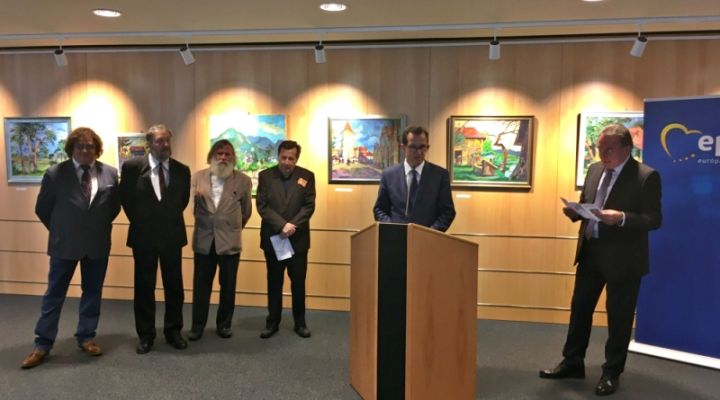Transylvanian painters’ exhibition in the European Parliament
Three Transylvanian painters were introduced in the European Parliament on Tuesday, 2 May at an exhibition hosted by RMDSZ MEPs Csaba Sógor and Gyula Winkler. György Katona, Emil Kovács Lajos and Károly Pongrácz's oil paintings not only lead the viewer through the Transylvanian landscapes but also through several big cities of the world.
Each of the three painters who started from Transylvania currently live and work in three different European countries - Romania, Hungary and Austria. "Looking at the exhibited paintings we can see that over the years various influences, compositional styles and trends have influenced their work, but all of them took over in their art one common thing: the painting traditions from Transylvania and Baia Mare", said Csaba Sógor at the opening ceremony. The MEP said that the exhibited paintings are clear examples of how art is an extraordinary tool that can cross borders and connect people while also being able to protect and convey a national identity.
"Recently, we are talking more and more about the future of the European Union, in this debate identity issues hold an essential place. The EU is a union that includes many identities; at the same time I am a citizen of my homeland, Transylvania, my country and of the Union. From this enumeration it is clear that in my view the closest identity is the local identity, and if anyone wants to understand what it means to be Hungarian in Transylvania, then they have to get acquainted with our culture and art. This exhibition is a good opportunity to do just that here, in the European Parliament", said MEP Gyula Winkler in his opening speech.
Art historian Jenő Murádin also praised the three artists' work. In his speech, he said: for every artist, no matter if he is a painter, a sculptor or a musician, it is a great honor to be introduced here, in the virtual center of Europe, in the emblematic building of the European Parliament. The art historian also stressed that the consistent organizational work of the Transylvanian MEPs confirms that the issue of approaching cultures sometimes depends greatly on individual initiatives.











